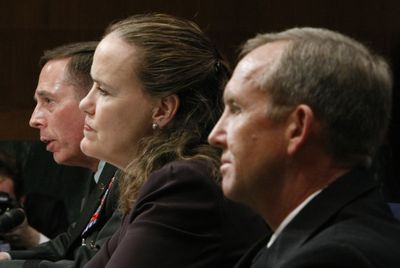South Asia conflict called grim
More troops possible for Afghanistan, Pakistan

WASHINGTON – The situation in Pakistan and Afghanistan is “increasingly dire,” top defense officials told Congress Wednesday, and they said President Barack Obama may have to send another 10,000 troops beyond the 21,500 he’s announced since taking office.
Michele Flournoy, the undersecretary of defense for policy, said the administration hasn’t yet developed benchmarks to measure progress, but she predicted high human and financial costs for the U.S. in the campaign against Islamic militants in the two countries.
Adding to the bleak picture, Army Gen. David Petraeus, the commander of the U.S. Central Command, expressed doubts about the reliability of Pakistani security forces in supporting the U.S. effort to curb the spread of Islamic extremism in South Asia.
Petraeus conceded the Pakistanis have betrayed America’s trust in the past. He said, however, the U.S. must show its commitment to the region, saying: “It is important the U.S. be seen as a reliable ally.” He said the military may need to send 10,000 more troops than the number Obama already has announced, and a decision must be made in the fall.
Although the administration has identified Pakistan, where al-Qaida’s top leaders are thought to be hiding, as key to its strategy, that strategy consists largely of encouraging the Pakistanis to take more aggressive action against the militants, which they’ve been loathe to do.
Members of the Senate Armed Services Committee said they doubted Pakistan can be trusted to thwart Taliban and al-Qaida activity in the border region with Afghanistan.
“I remain skeptical that Pakistan has the will or capability to secure their border,” said Sen. Carl Levin, D-Mich., the committee’s chairman, during the three-hour hearing.
Navy Adm. Eric T. Olson, the head of the U.S. Special Operations Command, also testified and called the situation in Afghanistan and Pakistan “increasingly dire.”
Sen. John McCain, R-Ariz., said he feared the administration is incrementally increasing its presence in the region instead of making a blunt change of strategy. Sen. Joseph Lieberman, a Connecticut independent who votes with the Democrats, asked if the U.S. plan for Afghanistan would better secure the U.S.
Sen. Susan Collins, R-Maine, asked, “How will we know if we’re winning?”
The administration said it’s still working out benchmarks.
But Flournoy said the U.S. mission in Afghanistan will be complete when “the Afghans and Pakistanis have both the capability and the will to deal with the remaining threat themselves.”